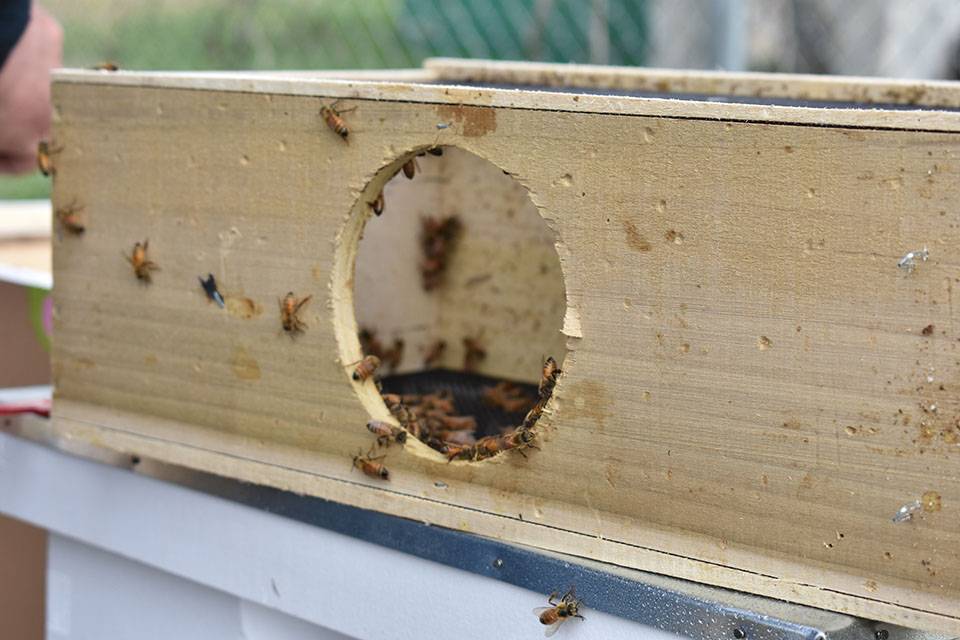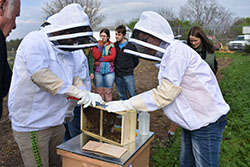
Northwest welcomed four boxes containing about 24,000 bees to its campus this spring in connection with the start of a bee club. The bees reside at the campus orchard. (Submitted photos)
June 3, 2019
 |
Members of the Northwest Bee Club introduced the bees to their new habitat April 22 as part of Earth Day activities on the campus. |
A new club is creating a buzz on the Northwest Missouri State University campus and awareness of the positive impacts pollinators have on the natural environment.
The Northwest Bee Club celebrated its founding with a ribbon cutting on April 22 to commemorate Earth Day and welcomed four hives of bees to their new home at the campus orchard. Eventually, two of the hives will be relocated to the Northwest’s R.T. Wright Farm north of the campus on Highway 71.
Abigail Rosonke, a freshman emergency disaster management and public relations major from St. Joseph, Missouri, is the founder and president of the club. She developed an interest in forming the club through conversation with a classmate who was familiar with maintaining hives.
“Bees are dying out all over the world and it’s a major concern,” Rosonke said. “A bunch of people were super interested in bees but didn’t know there was a possibility to have this club. The Bee Club is about getting people interested and wanting to learn about bee keeping.”
Pat Ward, the director of the Missouri Arboretum on the Northwest campus, began maintaining his first bee hive about 25 years ago and agreed to advise the club with Dr. David Shadinger, an associate professor of communication, as a faculty advisor. As Rosonke recruited members and the group established meetings and bylaws, Ward used his connections to secure the bees, equipment and other resources to support the club. Ward purchased four boxes containing a total of about 24,000 bees through his membership with the Jacksonville, Illinois-based Apple Creek Beekeepers Association.
Since arriving on the campus in April, the bees have adjusted well to their new environment, and members of the Bee Club take turns checking them and feeding them once a week, Ward said. Their population could grow to 60,000 in each hive by the end of the season, but their honey production is unlikely to be productive.
“It’s possible to produce, on a real good year, 50 pounds of honey per hive,” Ward said. “With all of this rain washing the nectar out of all the spring plants, that’s probably not going to happen. This has not been the best season with all the rain.”
Further, Ward notes, on average, 50 percent of hives die every winter – a phenomenon called Colony Collapse Disorder – as the result of a mix of factors, including chemicals, mites and disease.
“Insect populations have dropped to a point where, in some places, up to 75 percent of the biomass of insects has disappeared in the last 20 years, so we need insects of all kinds, not just honeybees, for pollination, for feeding other wildlife, for the web of life,” Ward said.
Part of the Bee Club’s work includes taking steps to ensure the bees can continue to play a valuable role in the local ecosystem. To combat Colony Collapse, the Bee Club and Northwest’s landscape team are placing additional pollinator plants on the campus.
“Being interested in bees and seeing how they operate – they really are amazing – all of a sudden, ties students in with the total environment,” Ward said. “You have to understand what they need for food and what they need for protection. I’m hoping that their interest in insects will lead to an interest in the environment as a whole.”
Additionally, the bee hives have the potential to provide rich research opportunities for students.
“I think the club will be a great opportunity for us as a University,” Rosonke said. “We have unique opportunities to study the bees and even have research forms for each hive so we can keep track. This allows us to put meaningful research out there for other universities to look at in hopes of learning what causes Colony Collapse Disorder and how to properly treat bees.”
Bee Club Secretary Molly Epperson, a sophomore wildlife ecology and conservation major from Blair, Nebraska, added, “Bees are essential for pollinating flowers and crops. Without bees, many fruits and vegetables we eat would not get pollinated and would not be produced.”
The Bee Club has many long-term goals that Rosonke hopes to achieve while she’s attending Northwest.
“I just hope more people will get interested in the club and that even after I leave there are still people interested and the bees are still here,” Rosonke said.